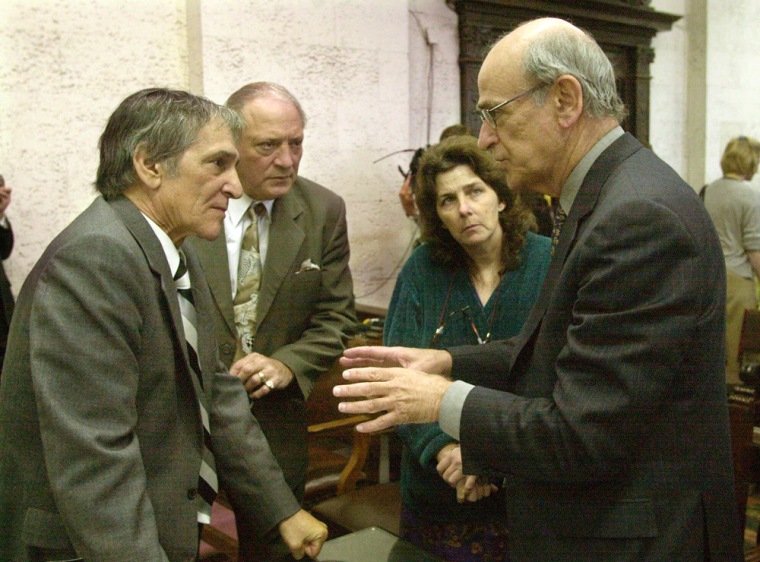The fortunes of America’s tobacco companies improved with the Florida Supreme Court’s decision Thursday to dismiss a $145 billion punitive damage award. Yet that same ruling also clears the path for individual smokers to file their own suits.
The court said an estimated 300,000 to 700,000 Floridians made ill by smoking and part of the suit will have one year to sue as individuals. And its decision to uphold the trial jury’s finding that the companies had negligently misled the public about cigarettes’ dangerous and addictive nature will be used in future plaintiff lawsuits.
“The court opened the door to a hundred thousand suits taking place in Florida for all those that are sick and dying or injured from these products,” said Tim Howard, an attorney who teaches constitutional law and judicial process at Boston University. “The court’s going to have a challenge managing the onslaught of cases.”
But on Thursday, Wall Street read the decision as beneficial for the tobacco industry, which had called the original verdict potentially ruinous. The court said the punitive damages were excessive under Florida law and that the case should not have been tried as a class action.
The decision caused tobacco stocks to jump, and it could also clear a path for Altria Group Inc., parent of the biggest U.S. cigarette maker Philip Morris USA, to make a long-awaited move to shed its controlling stake in Kraft Foods Inc.
‘Crippling to business’
“The damages would have been crippling to businesses,” said R.J. Reynolds Tobacco Co. spokesman David Howard, who added that the Winston-Salem, N.C.-based company is reviewing the ruling. “It was excessive. ... As a matter of law, punitive damages are not intended to put people out of business.”
William S. Ohlemeyer, Philip Morris USA vice president and associate general counsel, said the company is also reviewing the ruling and deciding if more appellate action is necessary.
The class-action trial lasted two years, but the seven jurors deliberated less than five hours to reach its $145 billion verdict in July 2000. The jury that decided the punitive damages said Philip Morris should pay nearly $74 billion, Reynolds more than $36 billion, Brown and Williamson more than $17.5 billion, Lorillard tobacco $16.25 billion and the Liggett Group $790 million.
And while the justices rejected the punitive damage award as excessive, a majority of the state’s high court reinstated a $2.85 million damage award to Mary Farnan and a $4.023 million award to Angie Della Vecchia, who started smoking as an 11-year-old and died in 1999.
Farnan broke into tears of joy upon hearing of the court’s ruling.
‘I'm shaking all over’
“Oh my God, I can’t believe it,” she said. “I’m shaking all over. I had no idea.”
A $5.8 million award to Frank Amodeo — who, like Farnan and Della Vecchia, was cancer-stricken and blamed that on his smoking habit — was not restored in Thursday’s ruling because it fell outside the statute of limitations. Amodeo’s wife, Margaret, told The Associated Press that her husband had not spoken with an attorney about the ruling and therefore did not have any immediate reaction.
The suit, led by pediatrician Dr. Howard Engle, was filed a decade ago in Miami by the husband-and-wife legal team of Stanley and Susan Rosenblatt.
Stanley Rosenblatt said Thursday he was disappointed with the decision but was relieved that the Supreme Court said individuals can sue and that the tobacco industry had misled the public.
“That they lied and were negligent, all those findings can be used and cannot be challenged in the individual cases as they go forward,” he said.
Several anti-smoking groups said they were saddened by the ruling.
‘Not the clear-cut victory’
“While disappointing, this ruling is not the clear-cut victory the tobacco industry was hoping for,” said Matthew Myers, president of the Washington-based Campaign for Tobacco-Free Kids, referring to the court’s ruling that individuals can still sue.
Myers suggested tougher legislation at the federal and state levels and more money for tobacco prevention programs.
“Elected officials at all levels must be held accountable if they fail to enact policies to stop the industry’s harmful practices and reduce tobacco’s terrible toll,” said Myers, who suggested tougher legislation at the federal and state levels and more money for tobacco prevention programs.
Only six of the seven justices heard the case. Justice Raoul Cantero did not participate.
